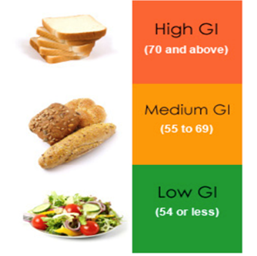
4. How reliable is glycemic index? |

![]() The Glycemic Index (GI) is a relative ranking of carbohydrate in foods according to how they affect blood glucose levels.Carbohydrates with a low GI value (55 or less) are more slowly digested, absorbed and metabolised and cause a lower and slower rise in blood glucose and, therefore insulin levels.
The Glycemic Index (GI) is a relative ranking of carbohydrate in foods according to how they affect blood glucose levels.Carbohydrates with a low GI value (55 or less) are more slowly digested, absorbed and metabolised and cause a lower and slower rise in blood glucose and, therefore insulin levels.
![]() In a study published in American Journal of Clinical Nutrition, researchers checked blood sugar responses in 63 healthy adults after eating the same amount of white bread three different times over 12 weeks. The intra- and inter-individual variability in glycemic response to a single food challenge and methodologic and biological factors that potentially mediate this response was evaluated. The investigators found that glycemic index values varied an average of 20 percent among individuals and 25 percent between different study participants. Part of this variability could be attributed to insulin index and baseline HbA1c levels, which reflect long-term glucose control—evidence that glycemic index values are influenced by an individual’s metabolic responses to food.
“Glycemic index values appear to be an unreliable indicator even under highly standardized conditions, and are unlikely to be useful in guiding food choices,” said lead study author Nirupa Matthan, Ph.D., scientist in the Cardiovascular Nutrition Laboratory at the USDA HNRCA.
In a study published in American Journal of Clinical Nutrition, researchers checked blood sugar responses in 63 healthy adults after eating the same amount of white bread three different times over 12 weeks. The intra- and inter-individual variability in glycemic response to a single food challenge and methodologic and biological factors that potentially mediate this response was evaluated. The investigators found that glycemic index values varied an average of 20 percent among individuals and 25 percent between different study participants. Part of this variability could be attributed to insulin index and baseline HbA1c levels, which reflect long-term glucose control—evidence that glycemic index values are influenced by an individual’s metabolic responses to food.
“Glycemic index values appear to be an unreliable indicator even under highly standardized conditions, and are unlikely to be useful in guiding food choices,” said lead study author Nirupa Matthan, Ph.D., scientist in the Cardiovascular Nutrition Laboratory at the USDA HNRCA.
![]() The authors note their findings do not suggest that a high glycemic index food may be healthy, or that a low glycemic index food unhealthy. Both glycemic index and glycemic load—a value that adjusts glycemic index to serving size—reflect only food containing carbohydrates, and no one eats food in isolation. The high variability of glycemic index and glycemic load reveal limitations in their clinical and public health applicability, and glycemic index estimates and subsequent associations with chronic disease risk needs to be reconsidered, say the authors.
The authors note their findings do not suggest that a high glycemic index food may be healthy, or that a low glycemic index food unhealthy. Both glycemic index and glycemic load—a value that adjusts glycemic index to serving size—reflect only food containing carbohydrates, and no one eats food in isolation. The high variability of glycemic index and glycemic load reveal limitations in their clinical and public health applicability, and glycemic index estimates and subsequent associations with chronic disease risk needs to be reconsidered, say the authors.
For enquiries info@jothydev.net.
Please visit: jothydev.net | research.jothydev.com | diabscreenkerala.net | jothydev.com/newsletter
